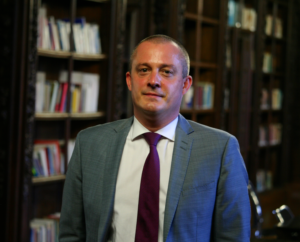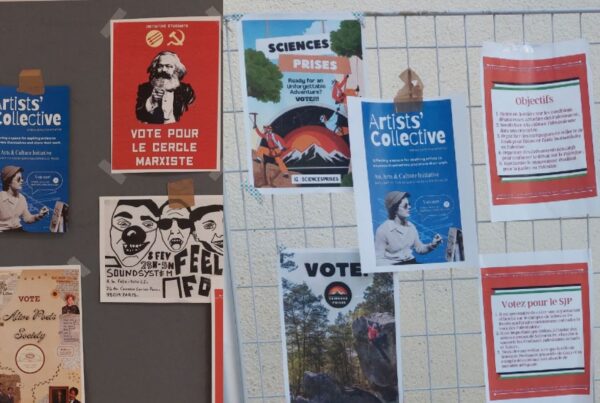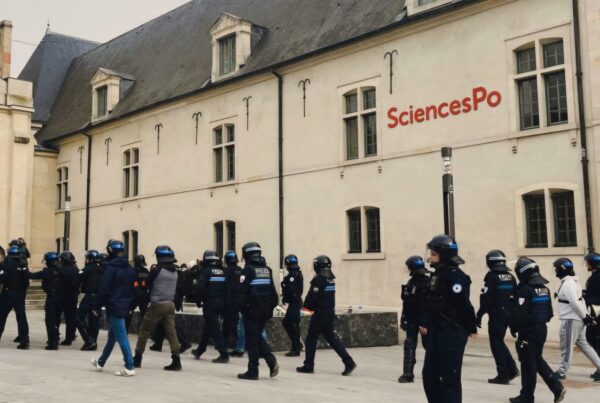
Papa du Campus with a suit and a tie.
by Ava LUQUET and Jurek WILLE
Tilman Turpin has been the director of Sciences Po’s Reims Campus since 2017. After graduating summa cum laude in political theory from Sciences Po’s graduate school, he worked in various capacities within the institution’s administration, last as Campus Director in Poitiers. When not wearing a suit and a tie to the beach, he enjoys using his extensive set of kitchen knives to cook, especially bo bun, a Vietnamese noodle soup. While “Turpin” sometimes fears coming off as “inhumane”, he joyfully accepted our invitation for an interview, covering everything from his response to the COVID-pandemic to his most embarrassing story as a student. This will hopefully change some students’ perceptions of him and result in more hour-long “Meet the Director” zoom meetings “discussing everything from depression to the best recipe for crêpes, champagne taste, and soccer results,” though he admits to know little about the latter.
This Interview has been edited for brevity and clarity.
The Sundial Press: How have you been these past six months?
Tilman TURPIN: It has been a very weird six months. I was with my four kids, who are from 5 to 14, so it was sort of lively at home. But it’s easy to feel lonely when you spend 10 hours per day on zoom. Especially since a zoom meeting is always an hour, 15 minutes of proactivity and 45 minutes of blah blah.
It was also very spooky coming back with no-one on campus. It was totally quiet for six months. I was alone on campus, with just the security guys sitting downstairs, reading the newspapers.
Obviously, during the entirety of confinement, we’ve been working to prepare this semester. Pretty close to the summer vacation, we weren’t sure whether we would be allowed to have students on campus. This is why the institution decided pretty quickly on this idea of a dual campus; to open the campus and to have all classes available online to allow students to choose whether to come or not.
We also had to prepare the correct number of classes for the number of students. Because we didn’t know how admitted students would respond given the situation, we accepted more 1As than last year. But at the end, we have roughly 60 more than expected, with 594 1As. So, it’s gonna be a bit occupied. In terms of those coming to Reims, 92% of the 2A students will be on campus, while 80% on the 1As are on campus. It is actually mostly French students who have decided not to come, they seem to prefer staying in Provence, Dunkerque… you know all these very nice places. The idea is that they can come as soon as they feel it is safe to.
TSP: Last semester, given the abruptness of changes, online classes were only imperfectly implemented. What changes has the administration prepared during these six months to ensure high-quality online courses and resources on and off-campus this semester?
TURPIN: First thing, all instructors have been trained to adapt their way of teaching. The way you construct courses is totally different if you know that they are going to be online. Online classes last two hours: maximum 90 minutes of teaching and 30 minutes for exchange, either in or outside the sessions. Ideally, it’s teaching 45 minutes, then having a break allowing students to breathe, ask questions, get up et cetera.
The second thing is that a lot of those who will be teaching this semester have already been through the experience of online teaching last semester. They know what the difficulties are. So, there has been a whole lot of work to answer your questions, and to make sure that the instructors know how to teach.
TSP: Since classes will be much shorter than the other years, how will you ensure that this year’s students do not get penalized by the situation by learning less?
TURPIN: Through strengthening everything that is linked to remote personal learning. We have also put into place the idea of “knowledge capsules”, which basically are videos with added content. There will also be things to read, things to watch. That implies discipline on the part of students, obviously. You can’t watch the 60 or 90 minutes of lecture, doing what students always do during lectures: being on Facebook, Twitter, Le Monde, Marmiton.
This is also why every class, even if it’s a virtual one, has a classroom. Because you can’t replace direct personal contact through remote meetings. We’ve all been through it, there is nothing worse than spending the whole day in front of the computer.
TSP: In the email you sent out, you said that we will be in class every other week. You split classes in half, does it mean that people on zoom cannot participate in class?
TURPIN: No. We have spent several hundred thousand euros for this campus alone, to make sure that every classroom is equipped with a camera system. In each classroom, we have Logitech bars and cameras, and the cameras follow the person that is talking, with intelligent microphones.
For the 2As, almost everybody will be there, but we had to divide the number of seats by two. So that means that every other week, you will be in class, but the week you are not following in class, you will be on zoom, and it is directly retransmitted from the classroom. The idea is that you can participate, to make it as interactive as possible.
TSP: With all of those changes, how can you ensure that our diploma will not have less value than the diplomas of other generations?
TURPIN: Why would it have less value? You are in the same institution. You follow the same curriculum. You have the same amount of credits. The contents have not changed, they have just been adapted. I don’t see any reason why your diploma would change. Some universities have just completely stopped teaching and just gave the credits. You continued working. You had exams. So on the contrary, it might even be that compared to other universities your diploma might be worth more.
TSP: You talked a lot about resources and support that you made available for us next semester. Can we also expect more resources and understanding from administration regarding certain situations, as mental health, financial support…?
TURPIN: I am fully aware that this is not a normal semester, and that yes, it is stressful for students. My colleagues, the academic advisor and the new Deputy Director Crystal Cordell Paris, are working with students who are in difficult situations right now, to see what can be done for them. For example, Central Services have been very lenient on financial questions for certain students.
Our position was never to say “We are in a corona crisis, everybody is suffering, so just try and survive and we don’t care.” The healthcare center continued to work fully during the confinement, at distance, with students who were in difficulties, and will continue to do so. Don’t hesitate. Don’t wait until it is too late. It is not because I wear a tie that it means you cannot talk to me and it is the same for everyone on the team.
TSP: What do you look the least forward to because of these new COVID-related policies implemented on campus?
TURPIN: The dangers inherent to COVID. There are going to be clusters. There are going to be students having COVID. It’s logical in the sense that there is no “zero risk”, and particularly not in the population of your age. I can ensure that rules are respected on campus, remind them: “Wear a mask”, “Keep distance”, “Wash your hands”, “Use hydroalcoholic solution.”
But I can’t do that outside. We have lost a student last week, due to a tragic accident, and that’s my worst fear. That we lose a student. This might sound cynical, but we are prepared for the rest. If we have to confine, classes will be online without any gap in time like in March. It’s not so much a fear about the capacity of teaching, it’s more about individual cases.
TSP: How has the pandemic affected your expectations of us, students?
TURPIN: First of all is to respect sanitary rules and regulations. If we say “wear a mask on campus”, it’s not because we don’t want to see your faces. It’s because again, we want to make sure that we limit the risks of transmission. For example, we are the only university institution in Reims who is doing an integration week, which also means that I very much hope that students will comply with the recommendations.
And then there are a whole lot of other things, but they are not linked to the COVID situation. I would like students to stop shouting at each other on social media. The semester has just started, and social media is already going crazy. I want this to be a place where you debate, talk, disagree, feel uncomfortable because you disagree, because your certitudes are being questioned. Everybody has to be able to say what they think, within the French legal framework. France has a very particular set of rules. It’s also part of the experience of coming here to learn and live with these rules.
TSP: You might have heard about the discussion about racism in France arising around Sciences Po’s recommended reading list. How do you want the debate between students who feel strong about race and racism and those who feel that their right to free speech is infringed to play out?
TURPIN: First of all, I would say there are problems, yes, and you have to talk about them. We are not living in a perfect world or country. Yes there is racism in this country. Yes there is homophobia in this country. Yes there is antisemitism in this country. There are a lot of “isms” and “phobias” in this country. France has a very particular conception of republic and equality, considering citizens not on the basis of their color, gender, sexual beliefs, sexual orientations et cetera, but as neutral citizens. Perhaps, it is time to think about whether this way of considering citizens in the 21st century is still possible.
But what is important is that everybody is allowed to talk about it. This is what makes an integrated community. I am what in the 21st century would be called a cis white male. Why would I not be allowed to talk about black women? That’s scary because at one point, that means that only I myself can talk about myself.
We had a project to work on an academic day of thinking about difference, alterity, inclusion, stereotypes on a very academic basis. Why at some moments we use them. Why, for example at the Minicrit, the dance sessions and the music sessions are very stereotyped. Why the EURAF program puts forward very visually African fashion and more generally African culture. Why on the other side in the EURAM program, being purple means belonging to this group and shouting it out loud in sometimes very obscene manners. In other words, why at one time is it okay to auto-stereotype yourself while it is not okay to be stereotyped.
TSP: If that is the case, why have projects by the Feminist Society, such as a Disorientation Guide or workshops, no place during Integration Week and receive no significant support from the administration and faculty?
TURPIN: There are two modules on discrimination, gender equality, and sexual harassment during Integration Week. I would be very happy to program more things in Integration Week. But you have been through Integration Week. I don’t know how much stuff you learned or heard during Integration Week you have actually kept in mind. I’d say maybe 25%. That is why we were working on workshops, but for the semester. We actually wanted to do it at the end of March, but for obvious reasons it didn’t work out.
In your generation, the feeling of being uncomfortable in a series of situations leads you to ask us to forbid a whole series of possible situations. “I am uncomfortable with this, I don’t wanna hear it, I don’t wanna see it.” It’s about academic debate. In the first semester of last year, you had a whole series of academic events all over the World which were cancelled. Because there were students saying “We don’t want to hear this.” That is absurd. It’s just as ridiculous as saying “I don’t wanna talk to you because you’re right-wing or because you’re left-wing. I don’t want to talk to you because you’re gay or you’re straight. I don’t want to talk to you because you like white chocolate and I like dark chocolate.”
TSP: Given everything you’ve just said, characteristics of our generation, racism, COVID, how do you think we can have a School Spirit, just like the last years?
TURPIN: In my sense, it’s not so much about a spirit in the way of a feeling of strong belonging. We are here to educate people, to think, to believe in our values. And they chose the values of our institutions by coming: liberty of thought, open-mindedness, curiosity, tolerance, et cetera. It’s around these values that you can create something. It’s a spirit of belonging to an intellectual community rather than brother-in-arms.
TSP: You studied at Sciences Po in Paris as an exchange student and master student, what has been your highlight?
TURPIN: I didn’t follow a vivid student life actually. I’m not a highly sociable person. One of my most embarrassing moments was in International Relations. I got back my first essay and I had a 16 and it said “Excellent” and no remarks. And you know, I think I embarrassed the professor because I spent 20 minutes trying to understand why he gave me a 16 and not a 20 out of 20.
And I think my best moment was when I was at the Master’s level in political theory. We had a very passionate discussion with my seminar professor, which did not interest anyone else. It lasted for several hours, during which I argued that the French translation of “The State of Emergency” of Carl Schmitt wasn’t very convincing. He was one of the big specialists of Carl Schmitt in France and I was 20 something and going “You’re wrong.” But I’ve been educated that way in the German university system, and I still consider it a student’s job to question our certainties and convictions.
TSP: Your LinkedIn Profile lacks a lot of information about what you have done. Why and does this mean that you will remain Campus Director for a number of years and are not currently looking for a job?
TURPIN: First of all, the reason is that I never really understood LinkedIn. But I think I’ll update my LinkedIn profile because it’s useful to stay in contact with former students. It’s sort of the same with Facebook. I’m not very active but I’m an active observer, just to see what’s going on. And actually, I watch more DIY videos than other stuff. So yes, I’m gonna update my LinkedIn profile. It’s just that I have to find my password.
(Editor’s note: He has found it, you can send invitations again!)
To the second part of the question. I’m not eternal, that’s obvious. I have a project for the campus, one of it being making it a general space for discussion. If I stop believing in the capacity of young people to discuss, debate, learn and to be intelligent, then I’ll leave. I’ll do something else. I’ll just open a bookshop in Brittany or a Bed-and-Breakfast. You know something completely different because it’s a tough job, with a lot of responsibilities. I enjoy it, but it’s tiring. So you know, I’m very happy where I am for the time being, as long as I have a vacation from time to time.
TSP: You very much enjoy an affordable red wine at Carrefour. Risking it being sold out the next time, would you share its name?
TURPIN: I have to go to Carrefour, I can’t remember it. By the way, I try as much as possible to avoid going to Carrefour Market. It’s always funny because when I meet students in Carrefour Market, their first reaction is to go “Uh my god, there is Turpin” and run away, even when they are behind me at the Cash out. It’s kind of weird that they see what I buy, so I don’t go that often. At one point of time, even if I’m a human being, I have a function and don’t want them to know which tuna bread I actually like… or share my red wine taste.
(Editor’s note: Mr. Turpin got back to us, the wine is called “Domaine de la Chique” and costs 5.90€ per bottle. He also recommends “La Voliera” for 7.50€ at Monoprix. Very “affordable” for students)
TSP: What is your pet peeve?
TURPIN: There are many things: not using the right knife when cooking is one of them. I have a very nice collection of kitchen knives because I cook a lot. So when someone doesn’t use the right knife, that upsets me. It’s certainly ridiculous, so if someone is doing that in my kitchen I go out, have a glass of red wine on the terrasse.
TSP: What do you miss most about Germany, if anything at all?
TURPIN: Yes, I do! What I miss is my favorite beach in Northern Germany, near Lübeck. And cheap ice cream in fact, good cheap ice cream. Ice cream is so expensive in France.
TSP: What do you do when you are not wearing a suit and a tie?
TURPIN: I like cooking, travelling. I spend a lot of time in nature with my kids, bike, walk, but also playing lego games, trying to avoid them spending too much time in front of screens. I read a lot. My kids do as well, so the first thing to do on Saturday morning is for them to come into our room with a book which they want us to read.
TSP: Are your kids going to Sciences Po later on?
TURPIN: I hope not, Sciences Po is too expensive (laughs). No, the eldest wants to become an artist. And the younger ones are a little too young to decide what they want to do.
TSP: Why is Reims Campus the best, and definitely better than Poitiers Campus?
TURPIN: Well, the first obvious reason is that we have Champagne and not Vouvray. You know it’s drinkable, just not as good as Champagne.
No but you can’t say a campus is better than another. Professionally it’s a challenge to take care of so many students. Poitiers had 180 students in a campus that was the size of the administrative building when I was there. So you know all students. I actually sometimes was at the front door at 7:59 because my office was right there. And so I just said “You’re late for class, hurry up”, you know, the Papa du Campus.
In Reims, obviously the place is just… I mean everybody who comes to this campus falls in love with it. It’s an incredible place to work at. The students are incredible as well, more diverse than they were in Poitiers. But you know, it’s a different dynamic. They are completely different. It’s like comparing a “tarte au citron” to a “clafouti.” Ça n’a pas de sens.
TSP: What do you look the most forward to during the 2020/2021 academic year?
TURPIN: A bit like every year, see students arrive, slowly, from the first day on and then grow into this place. That’s what gives us the energy to wake up in the morning. As Frederic Mion said, students’ expectations are a bit higher every year. We have tried to find a way of adapting well, accepting that some things are simply not possible. If at the end of the year, we have managed to assure that your classes have gone well, that you have been able to participate in student life, that you have had fun, learned things, enjoyed your time here, that’s the main one.
TSP: Do you have any last words for the students?
TURPIN: Keep calm and study social science! Enjoy time on campus and make it a place worthwhile being in all aspects: student life, academic, living.
Other posts that may interest you:
- The Trouble with ‘Ecocide’
- Carbon dioxide removal – hit or miss?
- Local Victories for Turkish Opposition — A Sign of Hope?
- Are France and Japan a Mismatch Made in Heaven?
- A Reflection on Dark Tourism
Discover more from The Sundial Press
Subscribe to get the latest posts sent to your email.





